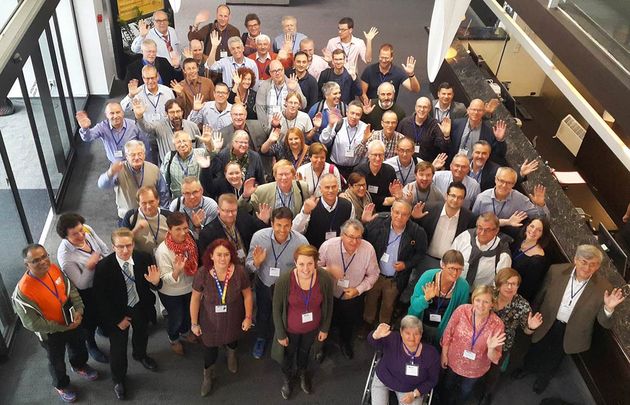Re-evangelising Europe, 500 years after the Reformation
The EEA General Assembly gathered to consider how Evangelical Christians across Europe might more effectively communicate the historic, biblical gospel to a secular society.
EEA · PRAGUE · 17 OCTOBER 2017 · 10:00 CET

The European Evangelical Alliance met for its annual General Assembly in Prague, Czech Republic on October 9–12, 2017.
Some 100 participants gathered to consider how Evangelical Christians across Europe might more effectively communicate the historic, biblical gospel to their secular, post-secular, postmodern, post-Christendom, post-communist culture, while confronted with
- millions of youth who have no relationship with the church,
- conflicts that have lasted for generations,
- migrants who have lost everything, and
- children who have no place to call home.
SECURITY AND IDENTITY IN GOD
As if God wanted to set the tone, the first meeting had to be moved from a conference hall to a lecture room, forcing all members and affiliates to sit like students, eager to learn things both new and old.
This tone continued as Rosalee Velloso led the group in considering anew the ancient but still relevant questions that Abraham had to face in Genesis 11 and 12. Would he give up his security in response to God’s call? What would his identity be? Where would his future lie?
In similar times of turmoil and uncertainty today, Evangelical Christians must decide whether to follow society’s trend towards emotion-driven discussions out of fear of security, building up walls and barriers to protect their identity, or to find their security and identity in God, fully embracing their biblical calling.
BEING A CHRISTIAN TODAY
Three Evangelical professors of theology provided expert input on contemporary situations.
Evert Van de Poll presented a wide-ranging and well-researched description of the challenges facing Christians in Europe.
Thomas K. Johnson discussed Evangelical–Roman Catholic relationships and their implications for evangelisation.
Johannes Reimer addressed current instances of social conflict and described the new initiatives of the EEA Peace and Reconciliation Network.
David Patty introduced the efforts of Josiah Venture in direct evangelistic efforts aimed at young people who have had little or no previous contact with the churches.

KRIS KANDIAH: HOPE AWARD
Dr. Krish Kandiah was honoured with the Hope Award for his efforts in founding and directing the new UK charity Home for Good.
This venture, which started as an initiative of the UK Alliance, is changing the role of Christians in the UK by caring for foster children and responding to the desperate needs of unaccompanied minor refugees.
Krish confronted the audience to ask their churches whether they simply want to continue serving people suffering due to the symptoms of social problems or if they are prepared to address the roots of those problems.
WHY DO PEOPLE LEAVE THE CHURCH?
While recognizing the need to make the Gospel known among people who are officially members of a church but who are not participating in a church and who do not appear to have a personal faith in Jesus Christ—the so-called nominal church members—participants were also encouraged to avoid working directly against other churches or denominations, including the Roman Catholic Church and the Orthodox Church, and to be transparent in discussing with leaders of other churches how to work together in evangelisation and practical witness to the Gospel.
It was noted that Evangelical churches also have their own nominal periphery. This situation calls for pastoral care and more research as to why some members of Evangelical churches stop attending church or do not openly confess their faith.
COMMITTED CHRISTIANS
As the participants of the EEA General Assembly left Prague to return to their home countries across Europe, they committed themselves afresh to:
- put their efforts into sharing the good news of Jesus Christ in evangelism to people in all sectors of society across Europe;
- put their efforts into showing the love of Jesus Christ in practical ways to people in need across Europe, not only dealing with symptoms but also addressing the root causes of those problems; and
- put their efforts into serious study of the needs of our neighbours and to leave our comfort zones for the benefit of our neighbours.
Published in: Evangelical Focus - europe - Re-evangelising Europe, 500 years after the Reformation
